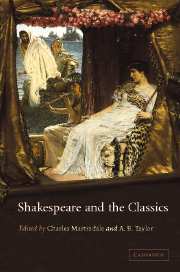Book contents
- Frontmatter
- Contents
- Notes on contributors
- List of abbreviations
- Introduction
- PART I AN INITIAL PERSPECTIVE
- PART II ‘SMALL LATINE’
- PART III ‘LESSE GREEK’
- 10 ‘Character’ in Plutarch and Shakespeare: Brutus, Julius Caesar, and Mark Antony
- 11 Plutarch, Shakespeare, and the alpha males
- 12 Action at a Distance: Shakespeare and the Greeks
- 13 Shakespeare and Greek romance: ‘Like an old tale still’
- 14 Shakespeare and Greek tragedy: strange relationship
- PART IV THE RECEPTION OF SHAKESPEARE'S CLASSICISM
- Select bibliography (compiled by Joanna Paul)
- Index
14 - Shakespeare and Greek tragedy: strange relationship
Published online by Cambridge University Press: 22 September 2009
- Frontmatter
- Contents
- Notes on contributors
- List of abbreviations
- Introduction
- PART I AN INITIAL PERSPECTIVE
- PART II ‘SMALL LATINE’
- PART III ‘LESSE GREEK’
- 10 ‘Character’ in Plutarch and Shakespeare: Brutus, Julius Caesar, and Mark Antony
- 11 Plutarch, Shakespeare, and the alpha males
- 12 Action at a Distance: Shakespeare and the Greeks
- 13 Shakespeare and Greek romance: ‘Like an old tale still’
- 14 Shakespeare and Greek tragedy: strange relationship
- PART IV THE RECEPTION OF SHAKESPEARE'S CLASSICISM
- Select bibliography (compiled by Joanna Paul)
- Index
Summary
Against all the odds, perhaps, there is a real affinity between Greek and Shakespearean tragedy. What there is not is any ‘reception’ in the ordinary sense: any influence of Greek tragedy on Shakespeare; any Shakespearean ‘reading’ of the Attic drama. There is no reason to suppose that Shakespeare ever encountered any of the Greek tragedians, either in the original language or otherwise. There were no English versions of Greek tragedy published in his time; and any indirect influence from Euripides, Sophocles, or Aeschylus will have been mediated through classical Latin sources and those, in turn, through Renaissance culture in general.
Of these Latin sources, Senecan drama is much the most important – albeit itself a form mediated through a more recent Continental tradition. Here, the sixteenth-century Italian tragedies of Cinthio and others play a special role. It is from this tradition that, as Marvin Herrick observed, Elizabethan drama derives its five-act structure, its ‘close-knit complex plot’, its ‘emphasis on revenge, blood and lust, ghosts and supernatural characters, prophetic dreams, elaborate laments’ – in short, its ‘attempt to out-Seneca Seneca’. For all that, Seneca himself, clearly, is a central presence. Seneca, for the Renaissance the ‘most available and prestigious ancient tragedian’, is cited in Hamlet by Polonius (‘whose opinions are unlikely to be other than conventional’) as ‘the prime model for tragedy’; and, all in all, Seneca, however removed from (even) Euripides, is – as a Roman writer looking back to (in particular) Euripides – no doubt ‘the closest Shakespeare ever got to Greek tragedy’.
- Type
- Chapter
- Information
- Shakespeare and the Classics , pp. 239 - 258Publisher: Cambridge University PressPrint publication year: 2004
- 7
- Cited by



